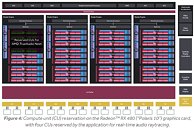- Joined
- Oct 9, 2007
- Messages
- 47,308 (7.52/day)
- Location
- Hyderabad, India
| System Name | RBMK-1000 |
|---|---|
| Processor | AMD Ryzen 7 5700G |
| Motherboard | ASUS ROG Strix B450-E Gaming |
| Cooling | DeepCool Gammax L240 V2 |
| Memory | 2x 8GB G.Skill Sniper X |
| Video Card(s) | Palit GeForce RTX 2080 SUPER GameRock |
| Storage | Western Digital Black NVMe 512GB |
| Display(s) | BenQ 1440p 60 Hz 27-inch |
| Case | Corsair Carbide 100R |
| Audio Device(s) | ASUS SupremeFX S1220A |
| Power Supply | Cooler Master MWE Gold 650W |
| Mouse | ASUS ROG Strix Impact |
| Keyboard | Gamdias Hermes E2 |
| Software | Windows 11 Pro |
AMD is developing a new GPU-accelerated audio pipeline to rival NVIDIA VRWorks Audio, the TrueAudio Next. The company will take this technology to the developers through its GPUOpen initiative. TrueAudio Next will bolster AMD's VR technologies portfolio, with a hardware-accelerated real-time "audio ray-tracing" pipeline that adds realism to sound in a 3D scene by computing how sound waves interact with the various objects in it. This is essentially what NVIDIA's VRWorks Audio does.
At the silicon level, processing the interaction between sound and surfaces in a 3D scene takes significant amount of compute power. On AMD "Polaris" architecture GPUs, such as the Radeon RX 480, TrueAudio Next will take advantage of Compute Unit Reservation, a feature which allows apps to temporarily reserve a portion of the GPU's CUs. Real-time positional audio DSPs such as TrueAudio Next and VRWorks Audio are expected to gain prominence with VR games, as CPU-based procedural audio-pipelines can't keep up with the faster inputs of a VR HMD to changing the 3D scene, than conventional input devices. Accelerated audio pipelines are needed to ensure that the audio output is fluidly in-sync with the video output, to avoid affecting realism.

View at TechPowerUp Main Site
At the silicon level, processing the interaction between sound and surfaces in a 3D scene takes significant amount of compute power. On AMD "Polaris" architecture GPUs, such as the Radeon RX 480, TrueAudio Next will take advantage of Compute Unit Reservation, a feature which allows apps to temporarily reserve a portion of the GPU's CUs. Real-time positional audio DSPs such as TrueAudio Next and VRWorks Audio are expected to gain prominence with VR games, as CPU-based procedural audio-pipelines can't keep up with the faster inputs of a VR HMD to changing the 3D scene, than conventional input devices. Accelerated audio pipelines are needed to ensure that the audio output is fluidly in-sync with the video output, to avoid affecting realism.

View at TechPowerUp Main Site




